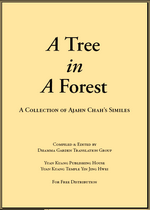The heart of things

DOWNLOAD BOOK:
A Tree in a Forest - A colletion of Ajahn Chah's similes.
Compiled and edited by Dharma Garden Translation Group,
www.buddhanet.net (PDF, 1.42 MB)
PRINT VERSION:
Book link to Amazon


In the end, people become neurotic. Why? Because they don't know. They just follow their moods and don't know how to look after their own minds. When themind has no one to look after it, it's like a child without a mother or a father to take care of him. An orphan has no refuge, without a refuge, he is very insecure.
This is a book that goes right to the heart of Buddhism in an absolutely intuitive way. A simple book that explores the essence of Buddhism through a chain of similes and aphorisms and narratives that are profoundly rooted to everyday life.
These similes are culled from the talks and discourses of a noted monk who followed the Thai forest tradition, Ajahn Chah. There are no elaborate references to the Buddhist texts (except in a few instances). They hit the truth in a very direct way, without much of explanation.
For instance, Ajahn Chah says that when you see "things in the world like banana peels that have no great value for you" you get along unscathed. That is as direct as it gets.
Some of the similes cannot be unravelled analytically. "How can you find right understanding? I can answer you simply by using this glass of water I am holding. ... Right understanding is to see this as a broken glass, as if it has already been shattered...," he says.
Others are seemingly easier to understand. Like this one, "In Buddhism we are endlessly hearing about letting go and about not clinging to anything. What does this mean? It means to hold but not to cling. Take this flashlight, for example. We wonder: "What is thig?" So we pick it up: "Oh it's a flashlight. Then we put it down again. We should hold things this way."
So, this is not a book that you read from the first page to the last looking for a structure.What it offers are glimpses, and how profound they are depends on how skilfully you see things. And does not Ajahn Chah himself say, "Read yourself, not books. Truth isn't outside. That's only memory, not wisdom. Memory without wisdom is like an empty thermos bottle - if you don't fill it, it's useless."
No comments:
Post a Comment